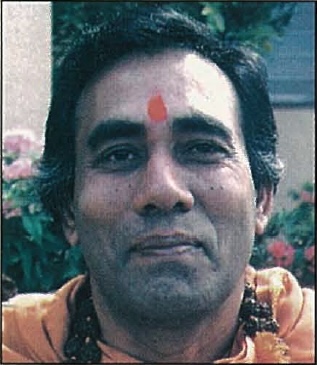CORPORAL PUNISHMENT IS TOTALLY NEEDLESSMY PARENTS AVOIDED IT, AND SO CAN YOU, BY ACKNOWLEDGING THE INHERENT DIVINITY OF A CHILD
By Swami Brahmavidyananda
Hindu culture is kindness. it teaches ahimsa, non-injury, physically, mentally and emotionally. It preaches against himsa, hurtfulness. My personal experience taught me that. I grew up in a simple, humble family in India. My father was a teacher. He followed Hindu principles strictly. He was closely associated with Mahatma Gandhi, who always taught against violence.
My parents never used harsh words or corporal punishment with me or my brothers, not even when we made mistakes. Rather, they guided us by communicating verbally. They were our living example. Although my father helped us develop our natural tendencies and abilities, it was enforced by his own self-discipline and not some sort of military discipline. He always used suggestions, not orders. He taught us to think properly before acting. He practiced self-punishment to correct us–we followed spiritual practices at home: meditation, worship, prayer and yoga sadhana. On any given day, for example, if we had not done a certain practice, he would not get angry. He would simply punish himself by not having breakfast. We would not feel good about this, so we would try to correct our mistakes. My father always talked about Mahatma Gandhi’s life. Gandhiji also practiced self-inflicted punishment to guide his followers.
During my 25-year residency in South and Central America and the US, many parents have complained to me about their children’s behavior. Many parents use corporal punishment to correct their children. I have always opposed this. Those who beat, hurt, slap or whip their children are enemies of religion, because they are pushing the next generation into lower levels of consciousness. My suggestion for these parents has always been that the problem is not the children, but themselves. By giving external punishment you cannot change internal habits, temperaments and natural tendencies. So, I ask them to change their own habits, nature, behavior, and way of acting toward their children. I suggest they always personally be good examples in word, thought and action. Often working parents bring problems home. Perhaps during their day’s work they are not satisfied with themselves. So, if their children do something wrong, they get angry and beat them without analyzing or thinking about it. This creates disharmony in the whole family.
Kids are innocent. A child’s growth begins with positive interaction between him/her and the parents. This period is crucial for education. Today’s society inspires violence. We even give toy guns and water pistols to our kids. We are saying, psychologically, “Express your violence!” We are giving a wrong message, that the only way to express anger is through violence. If that’s the state of interaction with our children, we are going to see much social disturbance and psychological imbalance in the future, and society does not have any infrastructure to deal with this. It is happening even now with the rise in crime and decline in values.
The mother’s role is very important in providing proper early experiences to her child. She is responsible for education. It is my request to all mothers to make a conscious effort to gain positive samskaras in their personality and life, express them in the family environment and then educate their children with those samskaras.
Communication between parents and children should be free and sincere. None should suppress feelings and emotions. Parents should be silent observers of their child’s actions. If parents follow the right path and self-discipline, children will follow what their parents have modeled. Swami Sivananda compared the child to a plant: “The soul is the root, the mind the trunk and the body constitutes the leaves. The leaves are important because they gather the sun’s rays for the entire tree. The trunk is equally important, however, and if the roots are not watered the whole tree will not survive for long.” If we don’t water and feed the soul of a child as well as the body and the mind, he or she will have difficulty in surviving.
Parents should know the needs, aspirations, strengths and limitations of every child. Paramahansa Niranjanananda calls it the “SWAN theory:” Strengths, Weaknesses, Aspirations and Needs. Children should be properly molded by parents. They are highly suggestible, like malleable metal. They will do whatever we tell them to do. They are very imitative and will copy our behavior, which is one of the greatest risks of using corporal punishment.
Every conscientious parent should promote a healthy outlook and sense of well-being in his children. He himself should be an ideal man. He should have sunshine within if he wishes to make his children brilliant and healthy. He should be full of life, light and joy. An unhappy, worried, sickly parent who is full of private griefs and woes cannot guide a child and lift him/her up to a high standard of life. The parent needs teaching and education first.
Based on my personal experience, we can raise kids without using corporal punishment. Many parents bring their children to our yoga ashram. We guide and inspire the parents and children with simple suggestions and spontaneous discipline. We observe great change in their nature and personality. According to the
Hindu law of reincarnation, children are born with their past samskaras. If you know how to guide them, you can discover the secret within themselves because they are the future scientists, yogis, doctors, and spiritual leaders who can make a change in the course of world events. The innocent child is a form of Divinity..
SWAMI BRAHMAVIDYANANDA, 53, is a disciple of Paramahansa Satyananda. He has taught Hinduism in India, the US, South and Central America. He directs Satyananda Yoga Ashram in Florida.


